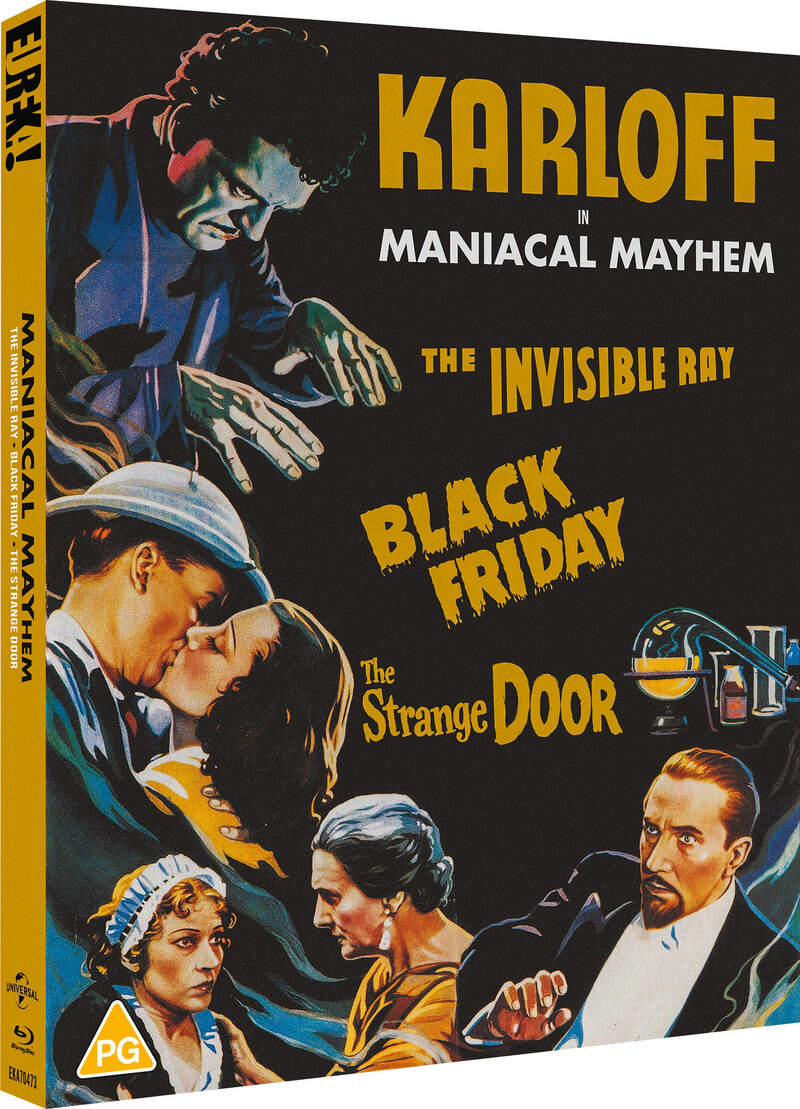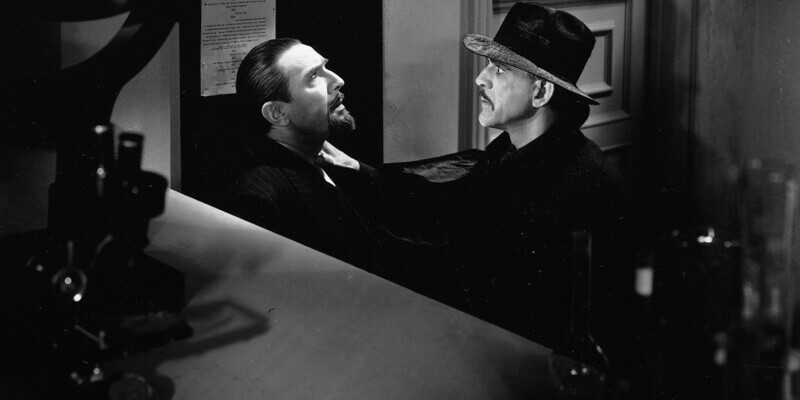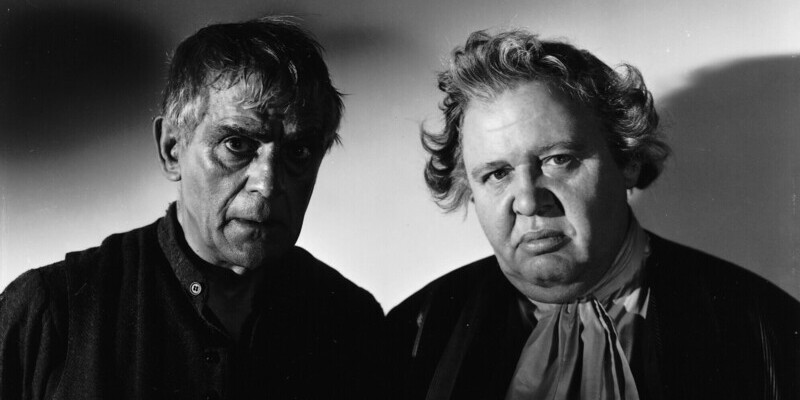
Eureka Entertainment's set features the UK blu-ray debuts of 1936's
The Invisible Ray, 1940's Black Friday and 1951's
The Strange Door, all starring Boris Karloff.


The Invisible Ray
1936's The Invisible Ray combines two popular
storylines of its decade – the jungle expedition and the mad scientist
taking revenge on those he believes wronged him. The bonkers boffin in
question here is Karloff's Janos Rukh, who has discovered a way to use
a telescope to gaze not just into the heavens but into the past.
Assembling a group of his peers who previously scoffed at his
theories, including Bela Lugosi's Felix Benet, Rukh shows how a
meteorite smashed into Africa. He believes said rock contains Radium
X, a substance whose powers could prove invaluable to science.
Thus begins the jungle expedition as Rukh and his now convinced
colleagues search the jungle of Nigeria for the meteorite (the earlier
flashback clearly showed the rock landing in southern Africa, but
African geography was never Hollywood's strong point). The weakest
segment of the movie, this has the usual assortment of terrified
natives being condescended to by the Western protagonists, and takes a
little longer than necessary to get to the meat of the story, i.e.
Rukh finding the rock and becoming poisoned by radiation.
Glowing like the Ready-Brek man (an effect later deployed on Lon
Chaney Jr in 1941's
Man-Made Monster), Rukh finds that everything he touches instantly dies. He becomes a
hermit at first but when he learns Benet has adopted Radium X in his
Paris surgery, where he restores sight to the blind, Rukh heads to
France and sets out to kill Benet and the rest of the expedition
crew.
After a sluggish second act in Africa, things really pick up on
European soil with a thrilling climax involving a trap set for the
glowing Rukh, reminiscent of the finale of James Whale's
The Invisible Man. Prolific director Lambert Hillyer keeps things moving along
nicely but it's the special effects of John P. Fulton that
really capture the imagination, particularly a shot of Rukh leaping
through a window before combusting in mid-air, extraordinarily
impressive for 1936. Also surprising for its time is the love affair
between Rukh's attractive young wife (Frances Drake) and a
rather stiff love interest (Frank Lawton). How this was snuck
past the Hays Code is anyone's guess.
Surprisingly, it's Karloff who delivers the ham while Lugosi gives
one of his more restrained performances. Karloff is all ticks and
gasps, while the Hungarian remains stiff as a board throughout, but
the scenes they share leave us in no doubt that we're watching what
for 1930s horror fans was the equivalent of Pacino and De Niro facing
off in Heat.
Black Friday
Director Arthur Lubin's Black Friday has nothing
to do with discounted electrical goods but rather offers a novel
premise that falls somewhere between Jekyll & Hyde and the
body-swap comedies of the 1980s.
Run over by a car driven by pursued mobster Red Cannon, mild-mannered
Professor George Kingsley falls into a coma, his prospects looking
dire. Luckily for him his best friend is the ingenious surgeon Dr.
Ernest Sovac (Karloff), who finds a way to transplant Cannon's brain
into Kingsley's head, bringing the latter back to life. Trouble is,
the mobster's brain is still partly alive inside the noggin of the
boffin, and he's determined to bump off his enemies.
Both Cannon and Kingsley are played by Stanley Ridges in what
is a staggeringly effective dual performance. Ridges fully convinces
as the George Raft-esque Cannon and the avuncular Kingsley, switching
between the two in the manner of Jekyll and Hyde. Karloff may receive
top billing, just ahead of Lugosi as a rival gangster, but it's Ridges
who steals the show.
The script by Curt Siodmak and Eric Taylor strikes a
fine line between comedy and horror, with both elements complementing
one another. Siodmak would expand this concept a couple of years later
with his novel 'Donovan's Brain', which later received its own
cinematic adaptation in 1953.


The Strange Door
Karloff goes from heel to hero in this 1951 adaptation of
Robert Louis Stevenson's story 'The Sire de Maletroit's Door',
though he's relegated very much to a supporting role despite his high
billing. The real star, and the real heel, is the great
Charles Laughton. He has a whale of a time playing the
villainous Sire Alain de Maletroit, a wealthy cad who has kept his
brother Edmond (Paul Cavanagh) locked in a dungeon for the past
20 years. Edmond's crime? Seducing the woman Alain was in love with
and fathering her child. That child has now grown up to be 20-year-old
Blanche (Sally Forrest), and Alain plots to further torment
Edmond by marrying her off to a scoundrel who will make her life a
misery.
Scouring the local taverns for a suitable, or rather unsuitable hubby
for his niece, Alain finds drunken lothario Denis de Beaulieu (Richard Stapley) and lures him to his castle, trapping him behind the strange door
of the title, which can only be opened from the outside (it never is
explained how Alain gets in and out of his gaff). Assuming he is to be
wed to a "toothless hag," Denis isn't too happy about Alain's plan,
but when he sets eyes on the pretty Blanche he only goes and falls in
love with her, threatening to ruin Alain's plan.
And what of Karloff? Well he's relegated to the role of Voltan, an
affable dimwit who has been secretly taking care of Edmond, who has
been faking insanity to prevent Alain from killing him off. Initially
untrustworthy of Denis, Voltan is roped into helping the newlyweds
make an escape from the clutches of Alain.
I'm an avowed fan of studio programmers of this era, but while they
boasted talented directors, great character actors and veteran crew
members, they do have one distinct weak spot – leading men. Any actor
who ticked off the boxes of being young, handsome and charismatic was
snapped up for A-pictures, leaving b-movies with a bunch of stiffs to
cast from. The wooden Stapley is a classic example. He certainly has
the handsome looks, but has all the personality of a wheelie bin.
Screenwriter Jerry Sackheim gives Denis plenty of witty retorts
to Alain's various jibes, but Stanley is never able to rise to
anywhere near Laughton's level. That said, Laughton is so fun to watch
that we can easily overlook Stapley's failure to match his presence.
Constantly nibbling on giant chicken legs and skipping around in
tights, Laughton is having the time of his life hamming it up here.
What a commendable lack of pretence the great actors of this era
had.
Alain's castle is a classic gothic set, beautifully lit by
cinematographer Irving Glassberg, whose light and shadow dance
through its hallways and dungeons. At 80 minutes, the film packs a lot
in (this story would likely require twice that length if remade
today), leading up to a tense finale as the walls literally begin
closing in around our heroes and only Karloff can save the day.

Bonus features:
New audio commentary tracks on The Invisible Ray and
The Strange Door with author Stephen Jones and
author/critic Kim Newman; a new audio commentary track on
Black Friday with Kevin Lyons and Jonathan Rigby; 'The
Sire de Maletroit’s Door' radio adaptations; stills galleries;
trailers; and a Limited Edition Collector’s Booklet featuring new
writing on all three films by film writers Andrew Graves, Rich Johnson
and Craig Ian Mann.

Maniacal Mayhem is on UK
blu-ray from October 17th.


